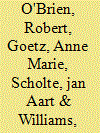|
|
|
Sort Order |
|
|
|
Items / Page
|
|
|
|
|
|
|
| Srl | Item |
| 1 |
ID:
046676


|
|
|
|
|
| Publication |
Cambridge, Cambridge University Press, 2000.
|
| Description |
xiv, 260p.
|
| Standard Number |
0521774403
|
|
|
|
|
|
|
|
|
|
|
|
Copies: C:1/I:0,R:0,Q:0
Circulation
| Accession# | Call# | Current Location | Status | Policy | Location |
| 045847 | 337.1/BRI 045847 | Main | On Shelf | General | |
|
|
|
|
| 2 |
ID:
178091


|
|
|
|
|
| Summary/Abstract |
This article examines what contemporary elites think about global governance and what these attitudes might bode for the future of global institutions. Evidence comes from a unique survey conducted in 2017–19 across six elite sectors (business, civil society, government bureaucracy, media, political parties, research) in six countries (Brazil, Germany, the Philippines, Russia, South Africa, the United States) and a global group. Bearing in mind some notable variation between countries, elite types, issue-areas and institutions, three main interconnected findings emerge. First, in principle, contemporary leaders in politics and society hold considerable readiness to pursue global-scale governance. Today's elites are not generally in a nationalist-protectionist-sovereigntist mood. Second, in practice, these elites on average hold medium-level confidence towards fourteen current global governance institutions. This evidence suggests that, while there is at present no legitimacy crisis of global governance among elites (as might encourage its decline), neither is there a legitimacy boom (as could spur its expansion). Third, if we probe what elites prioritize when they evaluate global governance, the surveyed leaders generally most underline democracy in the procedures of these bodies and effectiveness in their performance. This finding suggests that, to raise elites' future confidence in global governance, the institutions would do well to become more transparent in their operations and more impactful problem-solvers in their outcomes.
|
|
|
|
|
|
|
|
|
|
|
|
|
|
|
|
| 3 |
ID:
184654


|
|
|
|
|
| Summary/Abstract |
This article examines levels and patterns of legitimacy beliefs toward one of today’s most developed global multistakeholder regimes, the Internet Corporation for Assigned Names and Numbers (ICANN). Two complementary surveys find that levels of legitimacy perceptions toward ICANN often rank alongside, and sometimes ahead of, those for other sites of global governance, both multilateral and multistakeholder. Moreover, average legitimacy beliefs toward ICANN hold consistently across stakeholder sectors, geographical regions, and social groups. However, legitimacy beliefs decline as one moves away from the core of the regime, and many elites remain unaware of ICANN. Furthermore, many participants in Internet governance express only moderate (and sometimes low) confidence in ICANN. To this extent, the regime’s legitimacy is more fragile. Extrapolation from mixed evidence around ICANN suggests that, while multistakeholder global governance is not under existential threat, its legitimacy remains somewhat tenuous.
|
|
|
|
|
|
|
|
|
|
|
|
|
|
|
|
| 4 |
ID:
112942


|
|
|
|
|
| Publication |
2012.
|
| Summary/Abstract |
Does engagement with civil society generate more inclusive global governance? This article examines that question in the context of relations between the International Monetary Fund and civil society organizations in six countries of sub-Saharan Africa. IMF exchanges with CSOs in this region have indeed brought some new voices into global governance. However, the overall scale and depth of these connections has remained modest. Moreover, such engagement as has developed has generally favored geographically, socioeconomically, and culturally privileged constituencies. These limitations to, and hierarchies of, access and influence in IMF-CSO relations have resulted from a combination of: personal qualities of the individuals involved, institutional attributes of both the IMF and CSOs, and deeper structures of contemporary global politics. Attention to these various circumstances could yield greater inclusion.
|
|
|
|
|
|
|
|
|
|
|
|
|
|
|
|
|
|
|
|
|